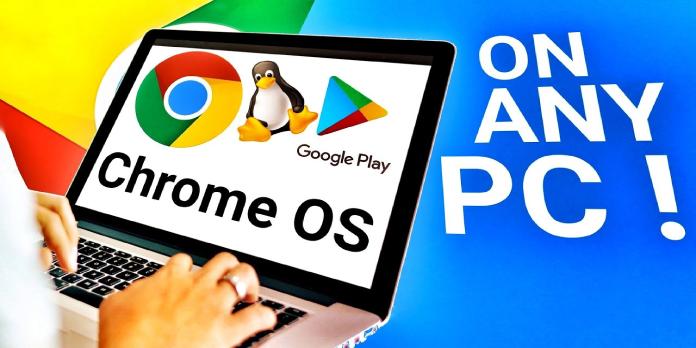Complete List of MS-DOS Commands
3324
30/11/2021

Want to turn any old computer into a Chromebook? Google doesn’t provide official builds of Chrome OS for anything but official Chromebooks, but there are ways you can install the open-source Chromium OS software or a similar operating system.
These are all easy to play with, so you can run them entirely from a USB drive to try them out. Installing them on your computer is optional.
Should You Really Do This?
RELATED:
The Best Chromebooks You Can Buy, 2017 Edition
The Chrome OS software is made for
Chromebooks
. Chromebooks are designed to be simple, lightweight, and get updates directly from Google. Chromebooks aren’t just about Chrome OS—they’re about the total package of a computer with a simple operating system. It’s also possible that not all your computer’s hardware will work perfectly with the below operating systems, while
Chromebook hardware
will definitely work perfectly with Chrome OS.
But you may want to get a browser-focused operating system on some old PC hardware you have running around—perhaps it used to run
Windows XP
and you’d rather have a more secure environment. Here are some ways you can do this.
Chromium OS (or Neverware CloudReady)
Google’s Chrome OS is built on an open-source project named
Chromium OS
. Google doesn’t offer builds of Chromium OS you can install yourself, but Neverware is a company that takes this open-source code and creates Neverware CloudReady. CloudReady is basically just Chromium OS with a few additional management features and mainstream hardware support, and Neverware sells it directly to schools and businesses that want to run Chrome OS on their existing PCs.
Advertisement
Neverware also offers a free version of
CloudReady for home users
. It’s basically just Chromium OS modified to work on existing PCs. As it’s Chromium OS-based, you won’t get a few extra features Google adds to Chrome OS, like
the ability to run Android apps
. Certain multimedia and DRM features may also not work on some websites.
While this isn’t the official version of Chrome OS produced by Google, it’s better and more well-supported than previous solutions created by enthusiasts. It even automatically updates to the newest builds of CloudReady offered by Neverware, although these tend to lag behind the latest versions of Chrome OS as Neverware has to customize them.
Neverware maintains a list of
officially supported devices
that have been certified to run with CloudReady. It doesn’t matter if your computer doesn’t appear on this list—there’s a good chance it will work alright, too. But there’s no guarantee everything will work perfectly, as there is with a Chromebook designed for Chrome OS.
RELATED:
How to Install Chrome OS from a USB Drive and Run It on Any PC
You’ll probably want to try Neverware CloudReady before installing it on a computer. All you need is either an 8 GB or 16 GB USB drive and an existing computer with Google Chrome installed. Follow
our guide to creating a CloudReady USB drive and booting it in a live environment
.
Give Neverware a try and, if you like it and it works well on your computer, you can install it on your computer by booting it
up, clicking the tray at the bottom-right corner of the screen, and selecting “install CloudReady”. Consult the officialNeverware CloudReady installation guide

How to Install Chromium OS on Raspberry Pi https://t.co/Tn3WEXDrX3 better toinstall 'proper' #gnu #linux like #raspbian
— Dr. Roy Schestowitz (罗伊) Fri Feb 28 01:05:25 +0000 2020
for more details.
Alternatively: Try a Lightweight Linux Desktop
Google officially supports Chrome on Linux. Any lightweight Linux distribution can work well, providing a minimal desktop where you can run Chrome—or another browser, like Firefox. Rather than attempting to install the open source version of Chrome OS or a Linux distribution designed to look like Chrome OS, you can just install a Linux distribution with a lightweight desktop environment—or any desktop environment, really—and use Chrome on that.
RELATED:
The Best Linux Distributions for Beginners
For example,
Lubuntu
is a great option if you’re looking for a lightweight Linux desktop that will run well on an older computer. However, any desktop will work. Consult our guide to
the best Linux distributions for beginners
to choose one that works for you.
Advertisement
Linux distributions make a great choice if you’re just looking for a basic desktop environment to browse on. They’re also a great way to upgrade any old computers you have that may be running Windows XP or Windows Vista, giving them a modern operating system with security updates and an up-to-date browser for free. You can even watch Netflix in Chrome on Linux now. There are no dirty hacks required—it just works.
Once you’ve chosen a Linux distribution, it’s as easy to try as Neverware CloudReady.
Create a bootable USB drive
for your Linux distribution,
boot from that USB drive
, and you can try the Linux environment without tampering with your computer’s software. If you decide you want to install it on your computer, you can do that right from the live environment.
Note that you may need to
disable Secure Boot
to boot some Linux distributions on modern PCs.
RELATED:
How to Create a Bootable Linux USB Flash Drive, the Easy Way
Of course, there’s no turning any old computer into a Chromebook. They won’t get Chrome OS updates straight from Google, and they won’t be optimized to boot as quickly. If you’re using a laptop, that laptop won’t necessarily offer the battery life a Chromebook does, either. But these are the best ways to approximate the experience, if you’re looking for something similar.
READ NEXT
›
How to Remove Suggestions from Chrome’s New Tab Page
›
How to Freely Move Pictures in Microsoft Word
›
How to Use Alexa Offline with Smart Home Devices Using Echo
›
How to Remove a Background in Photoshop
›
How to Get Your AirPods to Announce Calls and Notifications on iPhone
